24 Aug 2016 | mobile, News and features, Youth Board
Index recently appointed a new youth advisory board cohort. The eight young students and professionals, from countries including Hungary, Germany, India and the US, will hold their seats on the board until December.
Each month, board members meet online to discuss freedom of expression issues occurring around the world and complete an assignment that grows from that discussion. For their first task the board were asked to write a short bio and take a photo of themselves holding a quote that reflects their belief in free speech.
Sophia Smith-Galer 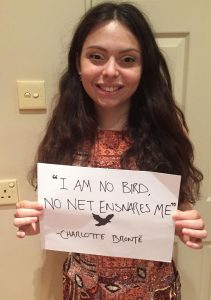
I’m half English, half Italian, and was born and raised in London. I have just graduated from Durham University with a degree in Spanish and Arabic and will be studying for a Master’s in broadcast journalism at City University next year.
I have just returned from a trip to New York after winning a multilingual world essay prize which included speaking at the United Nations’ General Assembly. I was in the group of Arabic language winners and our speeches were about tackling climate change, which is one of the UN’s sustainable development goals for 2030. Now that I am embarking on a career in journalism I’m looking forward to continue supporting these goals in my work.
Freedom of expression is particularly important to me as several countries that speak both of the languages I have dedicated years of study to continue to be plagued by tyrants and censors. I’m particularly interested addressing censorship in Latin America and the Middle East, especially with regard to the arts, as I’m also a classical singer and keen art historian.
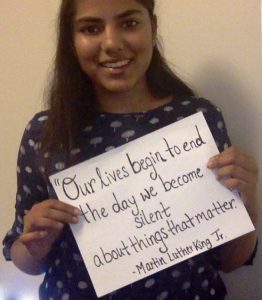
Shruti Venkatraman
Originally from Mumbai, I am currently a first year undergraduate studying law at the University of Edinburgh. As a law student, I am interested in advocacy in general, but I am particularly interested in advocating for fundamental human rights.
In today’s socio-political context, the phrase “freedom of expression” has gained importance and expanded in its meaning from it’s original intent to prevent minority persecution. Having lived in India and South Africa, I was able to grasp the importance of free speech in the context of regional history, and I learnt how human rights appeals have had local and global impacts and are inherently tied with social development. Index on Censorship’s admirable work to promote and defend freedom of expression highlights how important this cause is in our quest for social progress, justice and equality and how repression of these rights result in societal backwardness.
Niharika Pandit 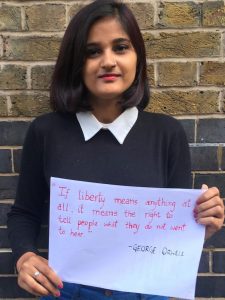
I am currently a master’s candidate at the Centre for Gender Studies at SOAS, University of London with South Asia as my focus area of gender research. I became interested in issues of censorship during my undergraduate studies in mass media with a specialisation in journalism from Bombay.
As a journalist and an active social media user in India, I was witness to numerous instances of online abuse, trolling and silencing of women politicians, journalists and activists who voiced opinions on political and social issues. As a response to the barrage of abuse in the online space, otherwise a liberating space to hear diversified opinions, I wrote a piece on Twitter trolls in India and the use of sexist abuse as a tool to muzzle women for Index on Censorship’s Young Writers’ Programme.
Within censorship, I am particularly interested in working on the intersections of social media, gender along with looking at censorship in militarised zones and its growing legitimacy in contemporary political ethos as part of my research.
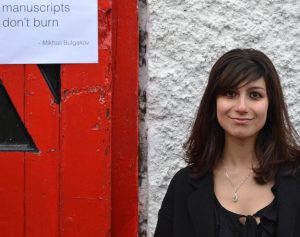
Layli Foroudi
It was studying literary works from the Soviet period during my undergraduate degree that highlighted the issue of censorship for me initially. Clearly this issue has outlived (and predates) the Soviet Union and is still of pressing concern in Russia today and globally. After graduating, I worked as a journalist on issues of freedom of expression and belief in Iran, and then in Russia at the Moscow Times. By pushing a state-sponsored version of the truth and punishing those at variance with it, these countries and others marginalise people and stifle innovation and creativity.
Freedom of expression and public debate underpin what society consists of and being denied this freedom is being denied the right to participation in society, as Hannah Arendt wrote: the polis is “the organisation of people as it arises out of acting and speaking together”. Historically, many have been denied the right to “act and speak”, based on ethnicity, gender, belief, immigration status, etc, and continue to be. I am interested in encouraging a diversity voices in the public sphere, something I have enjoyed exploring more this past year while undertaking an MPhil in race, ethnicity, and conflict at Trinity College Dublin and as a member of the youth advisory board since January.
Ian Morse 
I’m a student and journalist at Lafayette College in the US, but I have studied in Germany, Turkey and the UK. I really started studying news media when I lived in Turkey 18 months ago, because even then (much more so now) journalists and bloggers had a very tough time gathering and publishing good information. Since then, I’ve been a journalist in Turkey, the UK and Greece. I study history and mathematics-economics, but almost every project I do is focused on news media.
I’ve encountered freedom of expression violations in many fashions, from student pressures against speakers to petty government retaliation to Twitter blocking. There is quite a bit of nuance that is overlooked in many cases, but that nuance is needed to understand where the line needs to be drawn. Words have a lot of power in society – but it is often difficult to get the truth out when lies are louder or gags are stronger. I hope with Index that we can find ways to fix this.
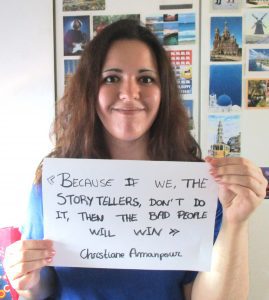
Anna Gumbau
I am a journalist living between Barcelona and Brussels. I am passionate about youth work, having volunteered for five years as member of AEGEE-Europe / European Students’ Forum, including a year as member of its international board. I have taken part in, and often led projects, run by students for other students all over Europe, on topics such as pluralism of media, election observation and media literacy. I am also involved in the field of internet governance, participating in the last two editions of the EuroDIG and joining the Youth Observatory of the Internet Society.
As a young media-maker who grew up listening to the stories of censorship in the times of the Spanish dictatorship, I believe strongly in free speech, a free press and media pluralism as essential pillars for democracy. I am fascinated by the power of words and freedom of expression to empower citizens and stand up to what they believe in. I also envision free media as a crucial element for better informed societies and, in extension, for more responsible individual citizens to participate in the public space.
Constantin Eckner 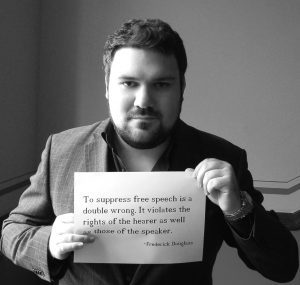
I am originally from Germany. I graduated from University of St Andrews with a master’s degree in modern history. Currently, I am a Ph.D. candidate specialising in human rights, asylum policy and the history of migration. Moreover, I have worked as a writer and journalist since I was 17 years old, covering a variety of topics over the years. Longer stays in cities like Budapest and Istanbul have raised my awareness for pressures exerted upon freedom of expression.
In a perfect world journalists, as well as every citizen, would live without fear of state censorship and potentially facing repercussions for the words they write or speak, for the pictures they draw, for the photos they shoot or for music they play.
Freedom of expression and access to information are cornerstones of an enlightened society. Unfortunately, in 2016 the world is still challenged by undemocratic regimes and powers that intend to quash people, which is an oppressive situation that has to change. It is up to us to help those who cannot raise their voice fearlessly.
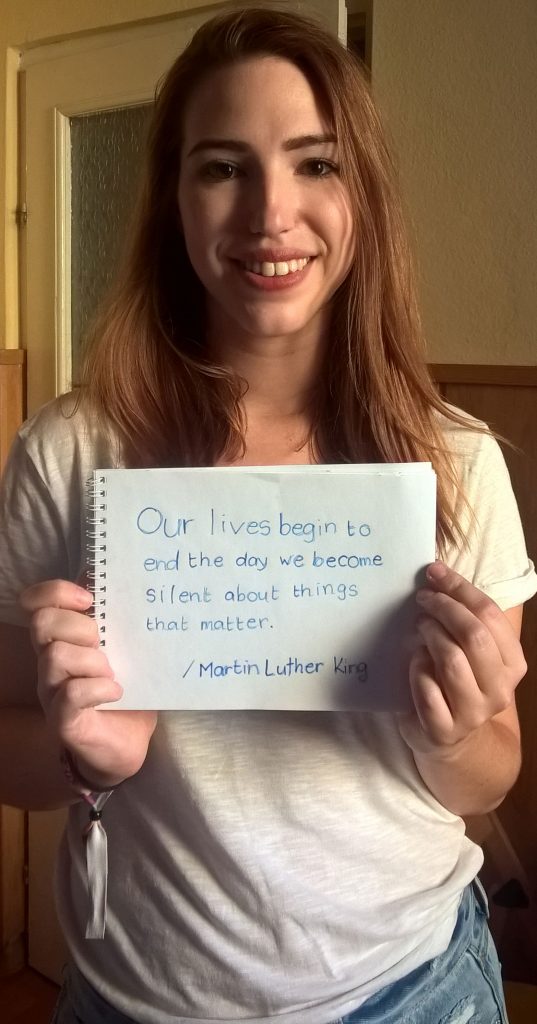 Fruzsina Katona
Fruzsina Katona
I was born and raised in Hungary, although I spent my pre-university years in a small town in eastern Hungary. Today I am a freelance journalist.
I always knew I wanted to be a journalist, since I was always interested in literally everything that surrounded me. The urge to publish became stronger at the age of 17, after I returned from Japan, where I spent a school year. That one year made me realise, that my home country is really far from the image I had of it. And the only way I can fight against corruption, abuses and narrow-mindedness – apart from voting – is to educate and inform the public. I took an internship at Hungary’s leading investigative journalism center, and 2015 Index on Censorship Freedom of Expression award-winner, Atlatszo.hu. I have worked for them as a freelancer ever since, and I enjoy my work pretty much.
I recently received a graduate degree in communication and media studies, and supplemented my “official” studies with training, workshops and conferences across Europe.
In the future I would like to be a post-conflict reporter or a human rights journalist, specialising in freedom of expression and the press.
23 Aug 2016 | Campaigns, Campaigns -- Featured, Media Freedom, Statements
Index on Censorship welcomes the delay in the Royal Charter recognition of Impress by the Press Regulation Panel and hopes it provides an opportunity for further consultation. We are extremely concerned that recognition of Impress has the potential to introduce punitive measures for small publishers and to stifle investigative journalism. We are also concerned that about the transparency of its funding. These are factors that threaten freedom of the press.
We hope the decision today gives an opportunity for a rethink.
Index remains concerned that, aside from the Royal Charter, other elements of legislation introduced in the wake of the Leveson Report represent a threat to media freedom. One of the most worrying of these is Section 40 of the Crime and Courts Act 2013, which sets out that an organisation which does not join a recognised regulator but falls under its remit (through being considered a “relevant publisher”) will potentially become subject to exemplary damages should they end up in court, and could also be forced to pay the costs of their opponents.
|
Such measures could be especially punitive for small publishers and news organisations with limited financial means.
|
|
There are two principles here that threaten a free press. Firstly, that in effect joining a regulator becomes less than voluntary if you have the threat of punitive damages hanging over your head. Secondly, that those who do not join and therefore feel under threat of exemplary damages will skirt away from controversial subjects and investigative journalism, and opt instead for “safe” stories.
Such measures could be especially punitive for small publishers and news organisations with limited financial means. This has a damaging effect on free expression. Supporters of this aspect of the act argue that exemplary damages would only apply to “reckless” action by journalists, but it is possible that a court could find that a breach of Article 8 rights to privacy and reputation was by definition “reckless” even when a journalist was pursuing an investigative news story in the public interest.”
Impress said in January it would accept donations of £3.8 million to cover the first four years of expenditure, which have been reported as coming almost exclusively from The Alexander Mosley Charitable Trust. The organisation’s own website provides only scant information about its current funding.
Although Impress has said it would not “be beholden to anyone” and that a charity would act as “buffer” between any donor from which it receives funds, the idea that a single wealthy individual should control the purse strings for a supposedly independent regulator should strike fear into the hearts of those who believe in a free press.
Index, a small publisher since 1972, has not signed up to a regulator.
21 October 2016: An earlier version of this article incorrectly stated that section 42 (3) of the Crime and Courts Act sets out that an organisation under its remit could be subject to damages if it does not join a recognised regulator.
23 Aug 2016 | News and features, Turkey, Turkey Uncensored
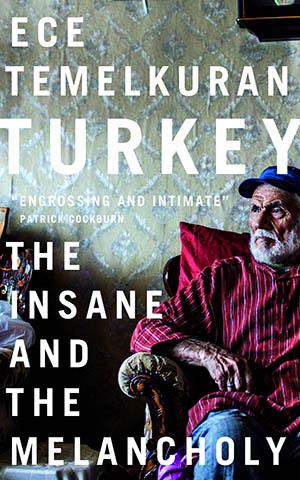 In an extract from her new book, Turkey: the Insane and the Melancholy, journalist and author Ece Temelkuran discusses the role of the Turkish ministry of culture in censoring theatre productions. Temelkuran will be speaking at Waterstones Trafalgar Square on 20 Sept.
In an extract from her new book, Turkey: the Insane and the Melancholy, journalist and author Ece Temelkuran discusses the role of the Turkish ministry of culture in censoring theatre productions. Temelkuran will be speaking at Waterstones Trafalgar Square on 20 Sept.
In 2013, the Ministry of Culture began to evaluate its subsidies to private theatres under the criterion of being “suitable with regard to public decency”. This enforcement arose as part of the Turkey Art Association (TÜSAK), which was put forward in a bill advocating the audition and support of art associations affiliated with the state. In this way, the legal foundation for state-imposed censorship was laid.
For the evaluation of private theatre companies’ grant requests to the Ministry of Culture, submission of the play’s script was made obligatory. Shakespeare’s Macbeth was removed from the State Theatre repertoire in 2014.
In December 2014, Sevket Demirkaya, who had previously held positions such as wrestling referee and municipal police chief, was appointed Director of the Istanbul Metropolitan Municipality Theatre Company. In 2013, the Ministry of Culture cut off its funding to the company of Genco Erkal, one of the most acclaimed stage personalities in Turkey, for supporting the Gezi protests. The Directorate General of State Opera and Ballet prohibited the wearing of certain garments, including leggings, in October 2014.
Theatre wasn’t the only thing Erdogan had a beef with, naturally. He was also passionate about sculpture. On 8 January 2011, during election preparations in Kars – a place the whole world is familiar with thanks to Orhan Pamuk’s novel Snow – he was once again yelling, “Freak show!”
The freak show in question was an enormous statue. The mayor, a member of his own party, was having a peace statue built in the city bordering Armenia, a statue that could be seen from Erivan. The work, by one of Turkey’s most renowned sculptors, Mehmet Aksoy, had just been completed when it turned out that it didn’t suit Erdogan’s tastes. A few months after Erdogan appraised the sculpture as a “freak show”, it was demolished in spite of every court ruling, and at quite a high cost. The worst part about it all was the cry of “the people” as they set about its destruction:
“Allahu akbar!”
I suppose that the intellectuals who were irked when I suggested that sometimes Turkey was like Afghanistan with a nicer shop window, who thought it “elitist and Jacobin”, probably shared my apprehensions on the day they witnessed that savage and wanton destruction.
Erdogan was also interested in music. That was why the work of Fazıl Say, a world-renowned composer and pianist who was critical of the AKP administration, was immediately removed from the repertoire of the Presidential Symphony Orchestra.
Perhaps the eeriest of these persecutions over the years came in December 2011, from the Minister of Internal Affairs. The Minister said: “The backyard of terrorism, walking around the back, and by backyard this could be Istanbul, could be Izmir, Bursa, Vienna, Germany, London, wherever – it could be a podium at the university, an association, a non-governmental organisation … They look like they’re just singing but they say something to the audience in between three songs, squeeze in a few lovely words. Whatever you take from it, however you understand it. They’re making art on that stage. What can you do? We are not against art, but we have to weed these out with the meticulousness of a surgeon.”
I wish the best of luck to the translator who has to translate these words. I hope readers, too, will manage to keep their wits intact after so much of the government’s poor self-expression.
In the wake of these declarations that signalled a new onslaught of custody and persecution, artists came up with a parody petition:
“Ban art! Put art within the scope of terrorist activity!”
This is an extract from Turkey: the Insane and the Melancholy (Zed Books, 2016) by Ece Temelkuran, which is available now.
Ece Temelkuran will be participating in two upcoming events:
15 Sep: The State of Turkey with Kaya Genç, Ece Temelkuran and Daniel Trilling
Join Index on Censorship magazine’s contributing editor Kaya Genç and fellow Turkish writer Ece Temelkuran for a discussion about the state of Turkey in the aftermath of the failed military coup.
20 Sep: Author Ece Temelkuran on the struggles that have shaped Turkey
Join Index on Censorship’s CEO Jodie Ginsberg as she presents an evening with award-winning journalist and novelist Ece Temelkuran to discuss her latest book Turkey: The Insane and the Melancholy.

Turkey Uncensored is an Index on Censorship project to publish a series of articles from censored Turkish writers, artists and translators.
22 Aug 2016 | Campaigns, Campaigns -- Featured, mobile, Statements, Turkey, Turkey Statements
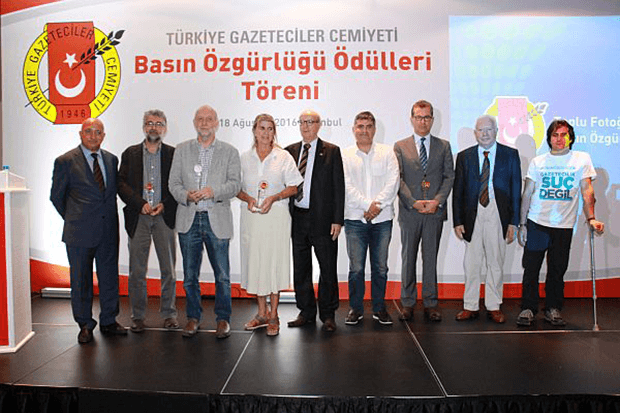
The awards were presented at a ceremony on Thursday 18 August. (Photo: TGC)
The Journalists Association of Turkey (TGC) on Thursday gave a 2016 Press Freedom Award to a coalition of international organisations, including Index on Censorship, that have worked in concert since last year to support journalists in the country and fight an ongoing deterioration in the state of press freedom.
“Press freedom cannot be taken for granted in any country and requires us to be constantly vigilant. As the post-coup crackdown continues, Index’s project Mapping Media Freedom is registering threats to the media, as well as publishing work from censored journalists, to help bring international attention to the issues. Index is grateful to be recognised for its work on behalf of the journalists of Turkey,” Rachael Jolley, deputy chief executive of Index on Censorship said.
The TGC award recognised the group of press freedom and free expression defenders, which came together as pressure on media increased ahead of the country’s second parliamentary election in 2015, for its collective efforts to bring awareness of press freedom violations in Turkey to the world at large and for supporting journalists of Turkey.
The group was assembled by the International Press Institute, which organised a press freedom mission to Turkey in October 2015.
IPI Executive Board Member Kadri Gürsel, chair of IPI’s Turkey National Committee, accepted the award on behalf of coalition members.
Noting the importance of international solidarity in support of Turkey’s journalists, he said that collective action is increasingly key, as pressure on independent media continues to increase under emergency rule declared in the wake of the failed July 15 coup.
The full text of Gürsel’s remarks appear below.
Honourable Chair,
Esteemed Jury members,
Fellow members of Journalists Association of Turkey,
Dear Guests,
Last year, Turkey provoked the creation of something that was the first of its kind in the world.
Almost all international press freedom organisations came together in order to form a coalition to defend the right of journalists in this country to perform their profession freely; a reaction to the political power having increased its repression of the freedom of the press to unprecedented levels in between the two elections.
The highly representative joint emergency press freedom mission of eight international organisations to Turkey on 19 to 21 October 2015 was the first of its kind in the world.
The mission was comprised of international and local representatives from the International Press Institute (IPI), the Committee to Protect Journalists (CPJ), Reporters Without Borders (RSF), the International Federation of Journalists (IFJ), the European Federation of Journalists (EFJ), Index on Censorship, ARTICLE 19 and the Ethical Journalism Network.
IPI’s Turkish National Committee and the Union of Journalists of Turkey, a member of the EFJ, endorsed the mission.
Showing solidarity with journalists in Turkey and underlining the fact in Turkey and abroad that growing pressure on independent media would jeopardise free and fair elections in the country – and of course demanding an immediate end to this pressure – were among the objectives of the mission.
The mission met with representatives of 20 media outlets in Istanbul and Ankara. It met with the representatives of opposition parties. It was impossible to get an appointment from the ruling party and from the office of President Erdogan.
The facts collected on the state of the freedom of the press in Turkey were shared with the world in a mission report published on Oct. 31, 2015. Suggestions were also made to make the situation better.
Despite its ad-hoc character, the coalition of international press freedom organisations for Turkey continued its activities with the participation of additional organisations.
The coalition coordinated the call of 50 leading editors around the world who on Oct. 30, 2015 urged President Erdogan to protect press freedom in Turkey.
It made a joint statement for the release of Cumhuriyet journalists Can Dündar and Erdem Gül, on Dec. 1, 2015.
The coalition made a joint statement to support a mission by RSF to Istanbul with the same purpose.
Representatives of organisations forming the coalition on Jan. 26, 2016 repeated their call for the release of Can Dündar and Erdem Gül at the gates of Silivri prison in Istanbul where the two journalists were held.
The coalition called on Turkey to drop all charges against the Cumhuriyet journalists on March 24, a day before their politically motivated trial.
Coalition members have also been active in submitting alerts to the Council of Europe’s platform to promote the protection of journalism and safety of journalists.
I’m standing here today on behalf of the coalition of international press freedom organisations for Turkey to receive this year’s Press Freedom Award of the Journalists Association of Turkey on the category of Institutions, given to the coalition.
On this occasion, I would like to mention names of member organisations of the coalition:
ARTICLE 19
The Committee to Protect Journalists (CPJ)
The Ethical Journalism Network (EJN)
The European Federation of Journalists (EFJ)
The International Federation of Journalists (IFJ)
Index on Censorship
PEN International
The International Press Institute (IPI)
Reporters Without Borders (RSF)
The World Association of Newspapers and News Publishers (WAN-IFRA)
On behalf of the member organisations, I extend our sincerest gratitude and thanks to the Journalists Association of Turkey for their decision to grant this year’s press freedom award to the coalition.
This award is very meaningful for us because it shows that the international solidarity made for the freedom and future of journalism is fairly evaluated and appreciated.
As facts have shown, the international solidarity of journalists has always been effective and a deterrent to repressive regimes that put media under pressure in order to prevent the public from being informed freely and objectively.
International solidarity is becoming more important these days; the repression of journalists and the media is gaining a destructive character with the unlawfulness of the emergency rule, insofar as the failed coup of July 15 has been used as a pretext for its implementation.
In consciousness of this fact, we are very thankful to the honourable jury members for granting us this award.
Full details of the awards are available are here.
Index will be exploring the situation in Turkey in a series of upcoming events:
12 Sept: Turkey beyond the headlines
Acclaimed writer Kaya Genç will talk to Rachael Jolley, editor of Index on Censorship magazine, about his forthcoming book Under the Shadow: Rage and Revolution in Modern Turkey.
15 Sept: The State of Turkey with Kaya Genç, Ece Temelkuran and Daniel Trilling
Join Index on Censorship magazine’s contributing editor Kaya Genç and fellow Turkish writer Ece Temelkuran for a discussion about the state of Turkey in the aftermath of the failed military coup.
20 Sept: Author Ece Temelkuran on the struggles that have shaped Turkey
Join Index on Censorship’s CEO Jodie Ginsberg as she presents an evening with award-winning journalist and novelist Ece Temelkuran to discuss her latest book Turkey: The Insane and the Melancholy.







 Fruzsina Katona
Fruzsina Katona


